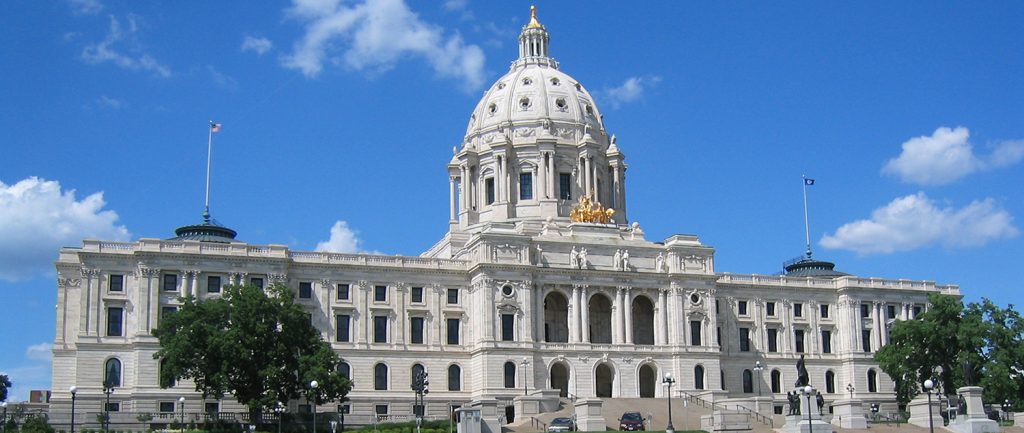Minnesota lawmakers missed a deadline for completing their year’s work, and transitioned straight into a special session early Tuesday to complete work on a $46 billion, two-year budget.
Three days later, the 2017 special session saw lawmakers pass final omnibus bills to be sent to Gov. Mark Dayton, with House and Senate members wrapping up their work Friday around 3 a.m. after a week of long days and nights at the State Capitol.
Before the legislature adjourned, the 2017 regular session legislators had reached agreement on only the four least controversial budget bills: agriculture, environment, higher education, jobs and energy.
The Agriculture Finance Bill represents a $4.97 million increase in the budget target, mostly in operating adjustments. In total, the agreement would appropriate $105.45 million for the Department of Agriculture, $10.87 million for the Board of Animal Health and $7.59 million for the Agricultural Utilization Research Institute. Included in the bill is a policy provision that clarifies that no Verification of Need or further documentation is needed before applying pesticides according to the federal label.
Another bill of interest passed before adjournment was the Omnibus Environment and Natural Resources Finance Bill.
Not included in the bill are delays for implementing the controversial buffer law. The date for buffers, or alternative water quality practices, to be in place on public waters would be Nov. 1, 2017, and Nov. 1, 2018, on ditches. The vetoed bill included a two-year delay.
However, the agreement does include a provision that provides an eight-month grace period to the 2017 deadline. Landowners who file a compliance plan with their soil and water conservation districts by Nov. 1 would be granted a conditional compliance waiver until July 1, 2018.
Dayton has 14 days to act on the special session measures and the five budget bills passed in the regular session that weren’t yet sent to him.
Lawmakers are scheduled to convene next on Feb. 20, 2018.
Found on the Floor:
Omnibus Agriculture Finance Bill
Sponsored by Rep. Rod Hamilton (R-Mountain Lake) and Sen. Torrey Westrom (R-Elbow Lake), HF895/ SF780 would appropriate more than $105 million during the upcoming biennium to fund the Department of Agriculture, Board of Animal Health and Agricultural Utilization Research Institute.
Those General Fund direct appropriations, in the new version of the bill, include:
• Department of Agriculture — $104.454 million
• Board of Animal Health — $10.876 million
• AURI — $7.586 million
Senate/House General Fund Compromise:
• $600,000 County noxious weed grants (Palmer amaranth)
• $500,00 MDA noxious weed program (Palmer amaranth)
• $250,00 MDA staffing noxious weed program
• $240,000 Wolf-Livestock prevention grants
• $500,000 pollinator habitat and research for identifying best practices and establishing habitat beneficial to pollinators
• Requires the Department of Agriculture to notify relevant media and post notice online when a weed on the state’s eradicate list is confirmed for the first time in a county.
• Restriction on verification of need;
• $ 24.8 million AGRI
• $ 18 .6 million AGREET
The bill awaits Governor Dayton’s signature.
Omnibus Environment and Natural Resources Finance Bill
Sponsored by Rep. Dan Fabian (R-Roseau) and Sen. Bill Ingebrigtsen (R-Alexandria), the bill SF844 would appropriate more than $850 million during the upcoming biennium and contains some of the changes sought by Dayton, who vetoed the initial omnibus environment bill May 12.
Not included in the bill are delays for implementing the controversial buffer law. The date for buffers, or alternative water quality practices, to be in place on public waters would be Nov. 1, 2017, and Nov. 1, 2018, on ditches. The vetoed bill included a two-year delay.
However, the agreement does include a provision that essentially provides an eight-month delay to the 2017 deadline. Landowners who file a compliance plan with their soil and water conservation districts by Nov. 1 would be granted a conditional compliance waiver until July 1, 2018.
Provisions of interest included in the bill include:
• Buffers Modifications
Clarifies that public waters are reclassified to shore land parcels, subject to the Nov. 1 2017 implementation deadline;
Codifies in law BWSR alternative practices and conservation practices based on local conditions approved by the local soil and water conservation district that are consistent with the Field Office Technical Guide;
Buffer strips must only seed mixes verified by the Department of Agriculture to prevent contamination with Palmer amaranth or other noxious weed seeds;
Provides a landowner or authorized agent that has filed a parcel-specific riparian protection compliance plan with the soil and water conservation district by November 1, 2017, shall be granted a conditional compliance waiver until July 1, 2018;
$4.0 million riparian aid to local governments.
The bill awaits Governor Dayton’s signature.
Omnibus Tax Bill
Called the largest tax relief package in 20 years, end-of-session negotiations produced a tentative agreement between leadership and the governor calling for $660 million in tax relief over the 2018-19 biennium.
Sponsored by Rep. Greg Davids (R-Preston) and Sen. Roger Chamberlain (R-Lino Lakes), HF1 was passed by the House 102-31 at the break of dawn Wednesday and sent to the Senate.
Republicans came into the 2017 session hoping the state’s projected $1.65 billion surplus would mean money returning to state taxpayers. However, the $1.15 billion omnibus tax bill passed during the regular session was too rich for the governor and met with a swift veto.
End-of-session negotiations produced an agreement between leadership and the governor that $650 million would go to tax relief over the 2018-19 biennium.
Two provisions are making the biggest impact to the agriculture sector. The first provides local property tax relief for farmers who carry a large share of the cost of school building bonds. The bills calls for 40 percent property tax relief for farmers for cost of school district bonding projects.
Second is riparian aide to local units of government. The bill appropriates $14 million dollars to counties and watershed districts that take on the jurisdiction of implementing and enforcing the states buffer strip law.
Not included in the final package is federal conformity to Section 179 expensing model. Section 179 expensing allows businesses to deduct the entire cost of certain equipment on their federal tax return in the year of purchase, instead of taking deductions for depreciation over a number of years.
Under current law, Minnesota limits this expensing for the year of purchase to $25,000 (the amount in effect at the federal level in 2003) for a maximum of $200,000 in expenses. Since 2003, Section 179 expensing limits have increased at the federal level. Under current federal law, the federal limit is $500,000 for up to $2 million in expensing. The bill would have conformed to the federal Section 179 expensing model.
The bill awaits Governor Dayton’s signature.
Omnibus Transportation Finance Bill
The House and Senate passed another omnibus transportation finance bill Wednesday that would rely on General Fund dollars to boost road and bridge spending.
The $5.9 billion, two-year transportation funding bill proposes to shift $300 million in auto-related sales tax revenues toward road and bridge construction funding. The bill also calls for $940 million in borrowing over four years — $640 million for general state road construction and $300 million for the Corridors of Commerce program.
Sponsored by Rep. Paul Torkelson (R-Hanska), SF HF3 was sent to the Senate Wednesday evening, where Sen. Scott Newman (R-Hutchinson) is the sponsor.
The proposal uses transportation-related state tax revenues to invest billions into roads and bridges over the course of the next 10 years. Key provisions in the transportation bill include:
• $16 million in FY18/19 for Small Cities Assistance Program for cities under 5,000
• $25 million to fund over 97 bridges on MNDOT’s priority list
• Statewide investment in roads: $102 million in trunk highway, $48 million for counties, $15 million for cities
• Ensuring that state funding will not be used to cover for operating costs of the proposed Southwest Light Rail
The bill awaits Governor Dayton’s signature.
Omnibus Legacy Bill
The House and Senate each voted late Sunday to repass a conference committee report on an omnibus Legacy finance bill that would appropriate $529.56 million during the upcoming biennium.
Sponsored by Rep. Bob Gunther (R-Fairmont) and Sen. Carrie Ruud (R-Breezy Point), the HF707 would appropriate money from the four funds established by the Clean Water, Land and Legacy Amendment in 2008 to benefit the state’s natural and cultural resources.
The bill includes a $22 million appropriation from the Clean Water Fund for grants to the state’s 90 soil and water conservation districts to help them comply with the 2015 buffer law meant to improve water quality.
There is also $3 million in CWF appropriations for the Conservation Reserve Enhancement Program, which pays landowners to retire environmentally sensitive land from production to help improve the environment. Mark Dayton signed an agreement with the United States Department of Agriculture in January to secure $350 million in federal funding for the program, but the state must commit $150 million of its own money.
Conferees added an amendment from Rep. Paul Torkelson (R-Hanska) that would redirect $5 million from surface and drinking water grants to Soil and Water Conservation Districts to help implement buffers or alternative practices. The amendment also specifies that $2.5 million of that total can be used outside the Conservation Reserve Enhancement Area – the 54 Minnesota counties designated with the highest need for removing improving water quality and protecting habitat.
The Agricultural Water Quality Certification Program would receive $5 million that would be used by the Department of Agriculture to help implement approved farm management practices that improve water quality.
Officials have testified they need at least $5 million in Clean Water Funds over the next biennium to leverage an additional $5.2 million in federal funds.
The bill awaits Governor Dayton’s signature.
Cory Bennett is the lobbyist for the Minnesota Soybean Growers Association.





